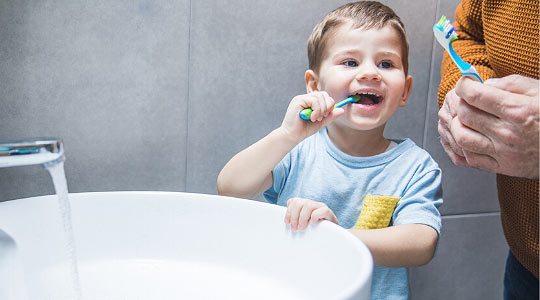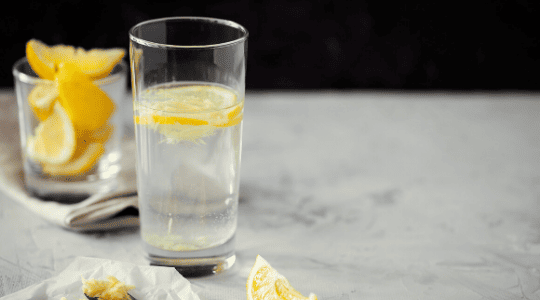
Common Dental Myths
Many common conceptions surrounding oral health may not be as accurate as you think. In fact, some popular beliefs and habits may be causing you more harm than good. Bupa Dental Care’s clinical director, Sarah Ramage, is here to bust some popular beliefs about oral health and offer some dental tips along the way.

1. Diet drinks are better for you
It's not only the sugar within soft drinks that causes tooth-damage, it is the acidity too. Diet, sugar-free fizzy drinks can contribute just as much wear to your enamel over time, potentially leading to heightened tooth-sensitivity, tooth decay, and even tooth loss.
Did you know fruit juice’s naturally-occurring sugars can also cause just as much damage? So, if you are looking for a refreshing and healthy alternative soft drink, we recommend water as the best option. Alternatively, if you want to treat yourself to a sweeter, acidic drink, use a straw to bypass your teeth as much as possible.

2. Charcoal toothpaste is better for you
You may have seen the charcoal toothpaste trend on Instagram and Facebook, but did you know the product can put your teeth at risk? The single most important ingredient within toothpaste is fluoride, which is essential for preventing tooth decay, yet many of the charcoal toothpastes available don’t currently contain enough of it.
When choosing your toothpaste, ensure that it is from a reputable and good quality manufacturer.

3. Only sugar causes tooth decay
Eating excess sugar, particularly processed sugar, puts you more at risk of cavities (tooth decay). As sugary food is broken down, it feeds plaque-producing bacteria within the mouth, and worsens the acids which can erode the surface of the teeth.
However, it is important to remember that even if you do not consume a lot of sugar, you will be at risk of tooth decay, if you fail to floss and brush correctly. Starchy carbohydrates can also cause plaque to form.

4. Harder brushing makes teeth cleaner
Brushing your teeth too hard can harm your teeth. It can wear away some of the enamel protecting the inside of your tooth from decay, cavities and receding gums.

5. White teeth are healthier
Although whiter teeth may appear to be in tip-top condition, they are not always a fool-proof indicator of good oral health. Natural tooth colouring varies in lightness, particularly as we age. Just because you have white teeth, this doesn’t mean visiting the dentist can be avoided. You may still have infections, cavities or other oral health issues which should be addressed sooner rather than later.

6. Braces are only for kids
While it is common for teens and children to undergo orthodontic treatment, gradually more and more adults are opting for braces. In addition to traditional fixed braces, advances in clear braces are now available as a more discreet option for adults, who were not otherwise able to solve their orthodontic problems when they were younger. Systems such as Invisalign treatment provide the ability for you to remove aligners for eating or special occasions.

7. You do not need to brush baby teeth
Beginning good brushing habits early on, helps set children’s patterns for a lifetime. Using the right brushing technique twice daily can help prevent plaque build-up, minimising your child’s chances of experiencing gum disease and tooth decay.
All children should see the dentist as soon as their first tooth comes through, and before their first birthday.
Taking your child to regular dental check-ups is important to ensure their oral health is maintained, and you can address any issues that may arise, early on. This is especially crucial as tooth extractions are the most common reason for children age 6 to 10 being admitted to hospital in England1.
8. Bad gums and teeth are inherited
The alignment, spacing, and size of your jaw and teeth are all inherited via your family lineage. However, you cannot inherit the propensity to lose your teeth, bad teeth or poor gums. The health of your gums and teeth relate directly to how you look after them on a daily basis.

9. Flossing is unnecessary
When thinking about oral hygiene, many people tend to think this only involves brushing. Flossing, on the other hand, is largely seen as less important, similar to the need to clean behind the ears, or trim nose hair.
However, while brushing teeth helps clean their surface, the bristles often struggle to get between them. Flossing cleans around one-third of the tooth surface, which normal brushing is incapable of reaching. Plus, if you floss or use interdental brushes to clear out debris before you brush, it gives your brush access to all areas.

10. Lemon and hot water = the perfect morning drink
Somewhat due to concern over stains, hot water and lemon is a popular morning alternative to tea. However, what some do not know, is that lemon is more harmful to your teeth.
While the stains from tea can be removed through professional cleaning with a hygienist or dentist, acid in lemon erodes the surface of teeth, which is not as easy to fix.
11. Brush your teeth right after eating
This is a common misconception. While freshening up the mouth after a snack maybe tempting, you should never brush your teeth straight after eating. After you eat, the change of pH level in the mouth makes teeth weaker, meaning brushing could damage your enamel. We recommend that you wait at least 30 minutes after eating or drinking, before you brush.
Find your local Bupa Dental Care practice
Looking after your teeth in the right way, avoiding bad habits, and attending regular dental check-ups is very important for long-term oral health. If you would like to see one of our hygienists or dentists, you can search for your local practice below.
We offer private and NHS check-ups across the country. To attend one of our practices, you don’t need to have insurance with us. Treatments and services are available to everyone.
1. Gov.uk: https://www.gov.uk/government/publications/hospital-tooth-extractions-of-0-to-19-year-olds


